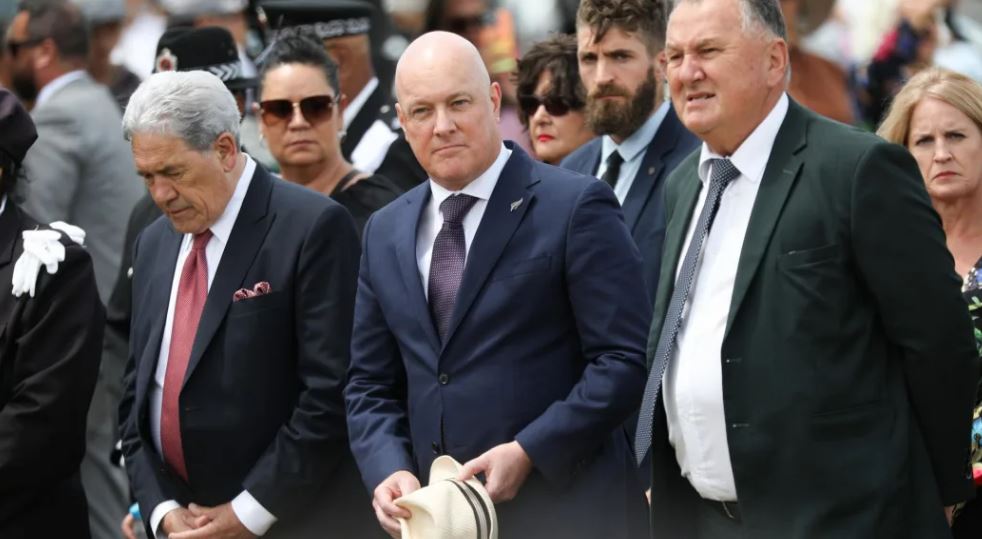Māori will not sit idly by, PM Luxon warned against ‘meddling with te Tiriti’
Thursday 25 January 2024 | Written by RNZ | Published in New Zealand, Regional

Winston Peters, Christopher Luxon and Shane Jones are greeted as they arrive at Rātana Pā. Photo: RNZ / ANGUS DREAVER/240124111
The New Zealand prime minister has been warned that Māori will not sit by without a fight if the government attempts to meddle with te Tiriti.
As politicians of all stripes flocked to Rātana near Whanganui, it was a rare chance for Māori to address politicians directly on the pae - something that holds extra weight this year, because the annual celebrations come so soon after last weekend's national hui.
Among those in attendance were Labour and Green MPs, Prime Minister Christopher Luxon, Deputy Prime Minister Winston Peters, and Fisheries Minister Shane Jones, while Te Pāti Māori were welcomed on Tuesday (NZ time). ACT did not have a representative there.
Raahui Papa, a representative of the Kiingitanga and Waikato-Tainui, said they were watching the rhetoric coming out of the Beehive very closely.
"Quite frankly, te iwi Māori - and the hui at Turangawaewae confirmed, the hui here at Rātana has confirmed - that if there is any measure of meddling with Te Tiriti o Waitangi, Māori will not sit idly by.
"The message is: The Tiriti o Waitangi is sacrosanct in the view of te ao Māori. We truly believe that the only treaty in town is the one that was written in the indigenous language."
Amid a climate of concern over the Treaty Principles legislation, Luxon is calling for calm over a bill he himself has said feels divisive.
"The government has no plans and never has had plans to amend or revise the Treaty, or the Treaty settlements that we have all worked so hard together to achieve.
"The government will honour the Treaty."
His speech to the Rātana faithful largely a speech to all Māori - and focusing on his favourite word: outcomes.
"Ours will be a government with goals for better healthcare, better school achievement, and less welfare dependency.
"When I talk about wanting better outcomes, I'm not talking about giving out hand-outs to close the gaps. I want to improve the opportunities so that people who are prepared to get to work and work hard, can make the most of their opportunities and get ahead."
Rātana representative Kamaka Manuel told the government that promise of better outcomes was hard to believe.
"What we do see is the first part of the word 'outcomes' - or like 'Māori out' - and we're left with the last part: 'how come'."
Luxon once again reiterated his claim that outcomes for Māori had gone backwards under Labour, and that National had "no intention and no commitment" to take ACT's Treaty Principles Bill beyond a first reading and select committee.
"It's consistent with our coalition agreements, we have said and I don't know how to be any clearer about it, there is no commitment to support it beyond the first reading."
There may be no commitment or intention at this point to do so, but Luxon has repeatedly refused to categorically rule out further support for it.
He was asked by reporters if he would say National would clearly say they would not support it further, but Luxon again said there was "no intention, no commitment".
Despite welcoming politicians of all stripes, Rātana and its faithful preach a philosophy of kotahitanga (untiy) and rangimarie (peace).
Winston Peters said he had not intended to, but gave a political speech anyway - lashing out at Labour to pockets of heckling.
"These people will promise you a bridge where there is no river ... I want to ask you this question: what's their record?" he said.
In an impromptu standup with reporters, NZ First's Shane Jones said a review of the Waitangi Tribunal would need to address whether its powers should remain intact.
"An institution that's been around for 50 years should not expect to continue on uncritically for another set of decades without being reviewed."
Spurred on by speeches from the mōrehu, Labour's Willie Jackson said it had made the opposition parties more united than ever.
"What they were saying the whaikōrero was that there was one enemy ... and the enemy was the government, and so they wanted us to all ... to come together as a group - Greens, Pāti Māori, Labour."
Labour leader Chris Hipkins, in his first public appearance of the year, spent all of a minute talking about Labour's deep connection to Rātana - and then went on the attack.
"The role of us as political leaders is to light that path forward, it's not to exploit the fear that comes from uncertainty."
Hipkins said the current government's approach was emboldening racism, which he later clarified related to things like the Treaty Principles Bill.
"I don't think those are things that a responsible government should do.
"The policies of this current government encourage, foster, and enable racism in New Zealand and we should call that out for what it is."
This time last year, Hipkins was speaking as prime minister. He now admitted - from the benefit of hindsight - the last government didn't get it all right.
"One of the things that we didn't get right was that making sure we were bringing non-Māori New Zealanders along with us on that journey."
There was a notable absentee - the ACT Party, whose Treaty Principles Bill National has agreed to support to Select Committee.












































